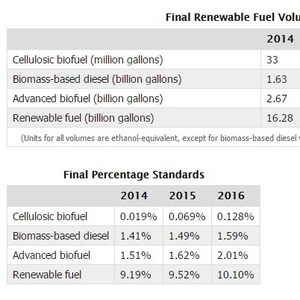API calls for repeal of RFS, ethanol industry responds

U.S. EPA
February 24, 2016
BY Erin Krueger
On Feb. 23, the American Petroleum Institute held a press conference, again calling for the repeal of the renewable fuel standard (RFS). Representatives of the ethanol industry have spoken out to dispute claims made by the API.
Frank Macchiarola, group director of downstream and industry operations at API, claimed the RFS could harm American consumers. “The United States is now the number one producer of oil and natural gas in the world,” he said. “It is well past time to reform this outdated energy policy to reflect today’s energy reality.”
Macchiarola also repeated several anti-ethanol claims often debunked by the renewable fuels industry, including that higher ethanol blends could damage vehicle engines, that breaching the blend wall could increase retail gasoline prices, and that increased ethanol mandates would lead to higher greenhouse gas (GHG) emissions.
Advertisement
Growth Energy issued a statement in response to API’s claims, noting that even though evidence continues to pour in of the consumer, economic and environmental benefits of ethanol, the oil industry continues to spout the same old, disproven points about ethanol and the RFS.
“The truth is that ethanol is the most tested fuel in history, and is a less expensive choice for consumers, said Growth Energy in its statement, noting the U.S. Department of Energy has tested ethanol blends for a total of 6 million miles and has shown zero instances of damage or performance issues. Growth Energy also cited NASCAR as using ethanol to drive more than 8 million miles, with drivers benefiting from increased engine performance and greater fuel efficiency.
“Though this kind of rhetoric should be shocking, it no longer is,” said Tom Buis, cochair of Growth Energy. “The oil industry has made a habit of repeatedly trotting out bogus studies for the single purpose of blocking competition and consumer choice to protect their profits. The fact is that rigorous testing and unbiased studies from the government and other industries have repeatedly demonstrated that ethanol and other biofuels are a less expensive, cleaner and better performing alternative to oil.”
Growth Energy said it’s obvious that API’s discredited study has no basis in fact and is simply an attempt to maintain its monopoly on the motor fuel marketplace. In reality, a strong, bipartisan majority of Americans support ethanol and the RFA, which provides our country with nearly 400,000 jobs and significantly cuts greenhouse gas emissions, continued the group.
Advertisement
“API's proposal will turn back the clock—and it must be rejected so that cleaner burning, higher performing biofuels will not be eliminated,” added Buis. “Congress should ignore a request that leads to an increase in air toxins and dirtier air to breathe."
Related Stories
The U.S. EPA on July 8 hosted virtual public hearing to gather input on the agency’s recently released proposed rule to set 2026 and 2027 RFS RVOs. Members of the biofuel industry were among those to offer testimony during the event.
The USDA’s Risk Management Agency is implementing multiple changes to the Camelina pilot insurance program for the 2026 and succeeding crop years. The changes will expand coverage options and provide greater flexibility for producers.
EcoCeres Inc. has signed a multi-year agreement to supply British Airways with sustainable aviation fuel (SAF). The fuel will be produced from 100% waste-based biomass feedstock, such as used cooking oil (UCO).
President Trump on July 4 signed the “One Big Beautiful Bill Act.” The legislation extends and updates the 45Z credit and revives a tax credit benefiting small biodiesel producers but repeals several other bioenergy-related tax incentives.
CARB on June 27 announced amendments to the state’s LCFS regulations will take effect beginning on July 1. The amended regulations were approved by the agency in November 2024, but implementation was delayed due to regulatory clarity issues.
Upcoming Events










